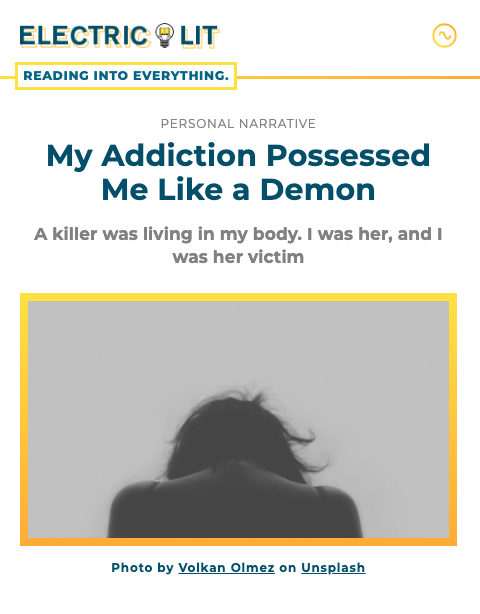“A demon needs a body to exist in our world, and so does addiction. That’s why they both sit in wait for the vulnerable: the grief-stricken, the lost, the genetically inclined.”
Alexandra Dos Santos’ addiction memoir in Electric Lit is a must-read. It’s about addiction, but it’s also about impostor syndrome and social anxiety. She’s a horror writer by trade, and based on this, I’m going to seek out more of her stuff. Come on now, this is excellent:
Addiction begins as a possession closer to the demonic infestation kind. First, there are signs—scratches on the skin, knocks on the wall, shadows in the corner—that darkness is closing in. It dances in your periphery, creeping a little closer each day until it opens the door of you wide, inviting more of its own kind in. A demon needs a body to exist in our world, and so does addiction. That’s why they both sit in wait for the vulnerable: the grief-stricken, the lost, the genetically inclined.
It unfolds like fiction, and there were moments when I was convinced it was fiction, that something paranormal was going to happen.
For a long time, I’d known I was spiraling but couldn’t say it out loud. I couldn’t even think it. A demon’s name holds all of its power. It will lie to you, tell you something else to misdirect you. Because once you have its name, you can command it out. That day, I named my demon for what it was, so I could send it back to hell. I decided to get sober.
It’s a haunting (sorry) bit of writing, and it had me thinking of the Carson McCullers thing from earlier this week. I wonder how much of McCullers’ own drinking problem was related to feeling overwhelmed by the expectations of a literary superstar who hasn’t yet turned 25.
Dos Santos also had a job scaring theme park attendees around Halloween. Her writing about working in a haunted house made me think of those interviews with Taylor Pollock from Cosmorat vs seeing her perform live. More from Dos Santos:
It was in tune with the physical realm—so much so that when she possessed me, I never inhabited it more. Splits, high kicks, crawling, running, punching walls, pulling out strands of my own hair. Weekend nights were The Evil Doll’s time to slip beneath my skin, open my mouth, and gasp a breath of relief. It was a ritual, a summoning come the time I clocked in, and a banishing the time I clocked out.
In the end, she’s well, and she’s learned to address her social anxiety by channeling the same instincts that The Evil Doll relies on – a kind of useful dissociation when she teaches her classes:
When I ask The Teacher to take over, I don’t do it just to hype myself up. I genuinely step to the side. I’m checking out, going home, and letting someone else do all the hard work for me. It almost feels like cheating. But she loves it, and I have stage fright, so why not? We don’t always have to be our own heroes; we don’t have to inhabit our bodies alone.
The idea that possession can be something we choose, letting the demon take over in periods of extreme stress and discomfort, makes a lot of sense to me. I’ve been thinking about writing something for this website that touches on these same ideas.
Read the piece. It’s brilliant.






